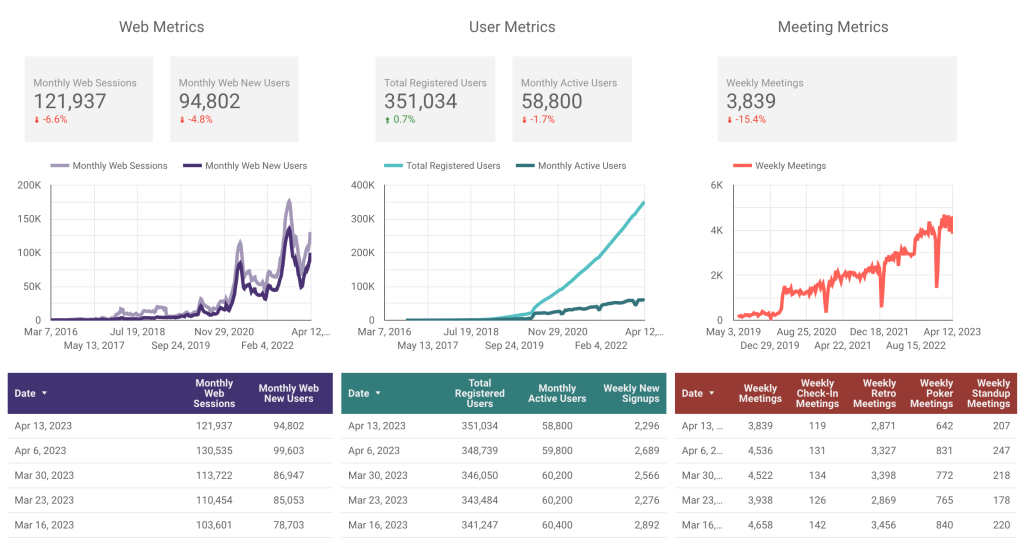#343 We Made a Mistake
Friday Ship #343 | April 14th, 2023

This week, we wrestled with how to respond to a visible and obvious mistake.
In the announcement email for our new AI summary feature, we included an image based on the ‘sure grandma’ meme. The image showed an older woman saying “In my days, we would re-read the sticky notes and have a note-taker in every retro,” and a younger woman responding, “Sure grandma, now let’s get you to bed.”
Shortly after the email went out, we started getting complaints:
Please pass on to your marketing team that ageist memes in communication isn’t a good look
As an older person (who is very happy and very capable of adopting new technology), you should know that the image in the email is actually offensive and you are perpetuating and encouraging ageist discrimination.
Don’t use aging seniors who need assistance to walk as the butt of your juvenile jokes
As the lead of our marketing team and the person who announcement emails come from, I was shocked: I had not seen this meaning to this meme.
One team member put it clearly:
You don’t know a blind spot til someone points it out.
Now, we saw our mistake, and we needed to respond.
Responding when users are upset
Our CEO Jordan Husney – who often keeps an eye on our support inbox – saw emails coming in, started answering users, and alerted our team. We didn’t spend any time crafting this message: it was a mistake, we were apologizing, there was no disagreement or need to talk about it.
Then, conversation turned to what else we should do. Do we send a follow-up email?
Different team members weighed in with perspectives. Ultimately, communications like this – both the initial email but also PR & comms on behalf of the company – are the responsibility of the marketing team. We dug in to consider what we now knew.
Had we seen the ageist implication, we would not have sent this email. It was a mistake, we just missed it. There was nothing more to say.
We don’t know how people will interpret memes. Speaking just for me, I missed this in part because (as I’ve now realized) I understood the ‘sure grandma’ meme very differently from others. I see it as making fun of the younger person, like “Look at this kid who doesn’t even know what a floppy disk is.” From the feedback we got, some folks saw this version as implying older people can’t adopt new technology, or making fun of mobility issues, which is not what we intended, and not the message I saw when I reviewed the draft email.
I hadn’t considered how the realities of age discrimination in tech or stereotypes about older people adopting technology would change the meaning of the image.
The meme is, at best, ambiguous, and we don’t know how our audience will generally interpret it. This was a strong reminder about the importance of having more perspectives, and a greater diversity of perspectives.
We don’t want to take up space in your inbox if we can avoid it. Most marketing emails are unwelcome, so we tend to err on not bugging our users. Since we didn’t know the impact of the original email, we couldn’t gauge whether receivers, in general, were upset and needed those feelings acknowledged, wanted an explanation from us, missed the email entirely, or read it and moved on with their day. We worried another email would be more of an intrusion than a relief.
Those who wrote in asked for action, not an apology. The folks that wrote in asked us to do better – to not send memes like this in future. We responded and apologized to them individually, and resolved to do better, now that we know better.
We ultimately decided not to send an email apology to everyone who got the original message because it seemed to be more for our benefit than theirs, an attempt to feel better about our mistake rather than action to improve.
Doing better
Reading this, you might fairly say, “Why didn’t your team know better before?”
When marketing teams misstep with memes or humor like this, the rallying cry around the internet is often about how it speaks volumes as to who wasn’t in the room when the decision was made.
And that’s accurate for us here: surely part of why we missed the ageist implication in this meme is that none of the folks who looked at it are older. We missed this reading because our team lacks this perspective.
There are, of course, many perspectives we lack as a small team. So, how can we do better given this limitation?
We decided to embrace a few principles:
- We already avoid ‘punching down’ in our messages, and had we seen this as making fun of a group of people, we wouldn’t have sent it. We can more consciously ask ourselves if a piece of communication might be punching down.
- If an email or a post is addressing an element of identity, and none of the folks at the table can represent that perspective, we shouldn’t send the message. We aren’t the right folks to decide if something is or isn’t ageist, for example, so we shouldn’t send a message referencing age groups in this way.
- When we get feedback, we can be open and grateful, we can take it in and deeply consider it. That’s what we’re trying to do with this post.
Metrics

We saw a slight down tick almost across the board, due to the Easter holiday last week.
This week we…
…gave our team a preview of the Activity Library we’re working on. Parabol team members got added to the feature flag and started to see the exciting work in progress!
…started booking user research interviews to explore an Insights feature. This is our most-requested features, and we’re excited to see what folks say about our first design!
…published a updated to our article on agile estimation techniques.
Next week we’ll
…start holding interviews for our Insights research!
…wrap up Sprint #119 with 🤞 a complete first edition of our Activity Library for internal testing.
